
Burger's Daughter
By Nadine Gordimer
Set in South Africa during the apartheid regime, this novel is about the dawning of a young white woman's political consciousness. The heroine, Rosa Burger, starts out rejecting the life of principle and activism that her parents have pursued and ends up...well, I won't spoil it for you. All the author's usual virtues are on display here: cool intelligence, an alarmingly acute understanding of human nature, a capacity to write about Big Issues without preachiness or the least sacrifice to her art. When I first read this, at 14, I thought for about a minute that I'd like to be Rosa when I grew up. Then I read it again and realized no, it was Nadine Gordimer I wanted to be.
By Nadine Gordimer
Set in South Africa during the apartheid regime, this novel is about the dawning of a young white woman's political consciousness. The heroine, Rosa Burger, starts out rejecting the life of principle and activism that her parents have pursued and ends up...well, I won't spoil it for you. All the author's usual virtues are on display here: cool intelligence, an alarmingly acute understanding of human nature, a capacity to write about Big Issues without preachiness or the least sacrifice to her art. When I first read this, at 14, I thought for about a minute that I'd like to be Rosa when I grew up. Then I read it again and realized no, it was Nadine Gordimer I wanted to be.
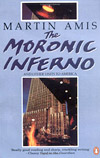
The Moronic Inferno
By Martin Amis
Amis is better known, particularly in this country, for his novels, but if I were going to be dropped on a desert island, this small, dazzling collection of his journalism about America is what I would choose to take with me. The pieces here, which range from portraits of Saul Bellow and Gloria Steinem to essays on AIDS and Palm Beach, are some of the most gloriously smart and funny things he has written. (And he's had quite a long career of being smart and funny.) Years ago, when I started out working for British newspapers, I gobbled up everything Amis wrote and sought, in vain, to emulate his bedazzling prose style. To this day, I find his writing properly inspirational. If ever I'm stuck or bored with what I'm doing, a quick draft of Amis helps to refire the engine.
By Martin Amis
Amis is better known, particularly in this country, for his novels, but if I were going to be dropped on a desert island, this small, dazzling collection of his journalism about America is what I would choose to take with me. The pieces here, which range from portraits of Saul Bellow and Gloria Steinem to essays on AIDS and Palm Beach, are some of the most gloriously smart and funny things he has written. (And he's had quite a long career of being smart and funny.) Years ago, when I started out working for British newspapers, I gobbled up everything Amis wrote and sought, in vain, to emulate his bedazzling prose style. To this day, I find his writing properly inspirational. If ever I'm stuck or bored with what I'm doing, a quick draft of Amis helps to refire the engine.
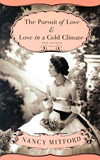
The Pursuit of Love
By Nancy Mitford
My mother gave me this and its sister novel, Love in a Cold Climate, at an airport once. I was 15 at the time—not an age at which you're inclined to put much faith in your mother's recommendations. But by the time I boarded the plane, I was completely sold, and I never looked askance at any of my mother's literary tips again. If you want to get a fair idea of what is meant by the phrase English humor, Mitford's largely autobiographical 1930s comedy about the lives and loves of the aristocratic Radlett family is as good a guide as any. It's not profound stuff. But, rather like P.G. Wodehouse, Mitford achieves a kind of greatness by staying unashamedly light.
By Nancy Mitford
My mother gave me this and its sister novel, Love in a Cold Climate, at an airport once. I was 15 at the time—not an age at which you're inclined to put much faith in your mother's recommendations. But by the time I boarded the plane, I was completely sold, and I never looked askance at any of my mother's literary tips again. If you want to get a fair idea of what is meant by the phrase English humor, Mitford's largely autobiographical 1930s comedy about the lives and loves of the aristocratic Radlett family is as good a guide as any. It's not profound stuff. But, rather like P.G. Wodehouse, Mitford achieves a kind of greatness by staying unashamedly light.
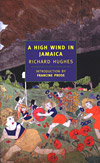
A High Wind in Jamaica
By Richard Hughes
This gorgeous and rather sinister novel, first published in 1929, is about five British children from colonial Jamaica who get waylaid by pirates on their way to England. Because it features several large, semifantastic characters and events (typhoons, pirates, and so on) and because its chief protagonists are children, the book is sometimes inaccurately classified as a young adult's story. It serves very well as that, but it is many other, better things besides: a wonderfully sharp and unsentimental portrait of childhood, a subtle disquisition on innocence and power, a startlingly beautiful piece of half-Victorian, half-modern prose.
By Richard Hughes
This gorgeous and rather sinister novel, first published in 1929, is about five British children from colonial Jamaica who get waylaid by pirates on their way to England. Because it features several large, semifantastic characters and events (typhoons, pirates, and so on) and because its chief protagonists are children, the book is sometimes inaccurately classified as a young adult's story. It serves very well as that, but it is many other, better things besides: a wonderfully sharp and unsentimental portrait of childhood, a subtle disquisition on innocence and power, a startlingly beautiful piece of half-Victorian, half-modern prose.
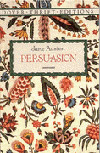
Persuasion
By Jane Austen
I worship all of Austen's novels, but if I have to choose one over the others, I plump for the autumnal pleasures of Persuasion. Anne Elliot, the principal marriage-seeker in this story, is an older, more disappointed heroine than we are used to encountering in Austen. When the novel begins, she is 27 and understood to be past her prime. (And we think we live in a youth-obsessed culture.) Years ago Anne was engaged to a naval officer called Wentworth but, on the bad advice of a friend, broke it off. Now the prospect of a spinster life spent depending on the kindness of snobbish, insufferable relatives is beckoning. This is the last work Austen completed before her death in 1817, and it is rather more tender and melancholy in tone than the novels that preceded it. I read it once or twice a year, whenever I feel in need of a good cry.
By Jane Austen
I worship all of Austen's novels, but if I have to choose one over the others, I plump for the autumnal pleasures of Persuasion. Anne Elliot, the principal marriage-seeker in this story, is an older, more disappointed heroine than we are used to encountering in Austen. When the novel begins, she is 27 and understood to be past her prime. (And we think we live in a youth-obsessed culture.) Years ago Anne was engaged to a naval officer called Wentworth but, on the bad advice of a friend, broke it off. Now the prospect of a spinster life spent depending on the kindness of snobbish, insufferable relatives is beckoning. This is the last work Austen completed before her death in 1817, and it is rather more tender and melancholy in tone than the novels that preceded it. I read it once or twice a year, whenever I feel in need of a good cry.
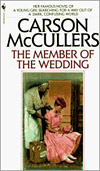
The Member of the Wedding
By Carson McCullers
The heroine of this excellent, not-quite-coming-of-age novel is 12-year-old Frankie Adams, a moody tomboy, stuck in a tiny Southern town, who fantasizes that she can escape the confines of childhood and of home by running away with her brother and his new wife: "At last she knew just who she was and understood where she was going. She loved her brother and the bride and she was a member of the wedding. The three of them would go into the world and they would always be together." Generally speaking, I don't look to books to address the particulars of my personal experience, but I happened to be 12 myself when I first picked this novel off my uncle's shelf. The thrill of recognition was intoxicating. It felt as if someone had read my rather hysterical journal and transformed it into lucid literary prose. Years later, when my first daughter was born, I named her Frankie in McCullers's honor.
By Carson McCullers
The heroine of this excellent, not-quite-coming-of-age novel is 12-year-old Frankie Adams, a moody tomboy, stuck in a tiny Southern town, who fantasizes that she can escape the confines of childhood and of home by running away with her brother and his new wife: "At last she knew just who she was and understood where she was going. She loved her brother and the bride and she was a member of the wedding. The three of them would go into the world and they would always be together." Generally speaking, I don't look to books to address the particulars of my personal experience, but I happened to be 12 myself when I first picked this novel off my uncle's shelf. The thrill of recognition was intoxicating. It felt as if someone had read my rather hysterical journal and transformed it into lucid literary prose. Years later, when my first daughter was born, I named her Frankie in McCullers's honor.




